

99%
96%


1000s of Service
Hours Provided to the Community
Three Ways You Can Change a Life









99%
96%


1000s of Service
Hours Provided to the Community







Eugene Park, CPA Chair, Arizona Society of CPAs Consulting Partner
Heinfeld, Meech & Co., P.C.
When I was asked to serve on the board of directors of the Arizona Society of CPAs (ASCPA), I honestly didn’t know what to expect, but I accepted the invitation without hesitation. Now four years later, I am thrilled and honored to be stepping into the role of chair for this incredible organization. As I take on the role of chair, I reflect on how far the ASCPA has come, as well as myself.
When I first joined the board, I had just graduated from the AICPA’s Leadership Academy, a transformative experience that taught me so much about myself and what this profession truly means to me. It was during that time that I realized what my “one big thing” was – I wanted to make a lasting impact, regardless of my title. Serving on the board has been an incredible opportunity to put that desire into action.
The past four years have been an eye-opening journey that has allowed me to connect with a diverse group of CPAs from all walks of life. As someone who had spent most of my career in audit and now consulting, I was thrilled to step outside my “bubble” and engage with CPAs from various backgrounds.
While some of us may compete in the business world, when we come together as part of the ASCPA, there is a profound sense of collaboration and teamwork. Regardless of individual professional goals, we all share a commitment to strengthening the CPA profession and ensuring its continued success. This exposure has broadened my perspective and deepened my appreciation for the diversity within our profession, and the feeling of camaraderie has been incredibly encouraging and motivating.
Over the years, I’ve seen the ASCPA team tackle some of the most pressing issues facing our profession. One of the primary challenges we’ve been addressing is the shortage of new talent entering the CPA pipeline. It has been both rewarding and inspiring to see the various initiatives aimed at solving this issue. From student outreach programs to new initiatives designed to attract young talent, the ASCPA has worked tirelessly to engage the next generation of CPAs. I’ve had the privilege of attending recruiting events and seeing firsthand how the ASCPA team has actively worked to raise awareness and create new opportunities for students to explore careers in accounting.
In addition to these student-focused initiatives, the ASCPA has also been making strides in providing valuable Continuing Professional Education (CPE) offerings for professionals across all stages of their careers. Recently, there has been a strong emphasis on diversifying and expanding CPE opportunities, particularly in critical areas that go beyond technical knowledge; areas such as communication, leadership and team collaboration.
While these efforts are undeniably important, the greatest benefit I’ve experienced during my time on the board has been the relationships I’ve built. At our recent strategic planning meeting, one of the key goals we identified was fostering engagement. As we discussed how to engage professionals, students and the broader community, it became clear to me that meaningful engagement is at the heart of everything we do. The unique individuals within our profession – each with their own story, are what make this profession so enjoyable and fulfilling.
In conclusion, the past four years have been truly rewarding. The chance to serve on the ASCPA board has given me the opportunity to make an impact, build lasting relationships and contribute to a brighter future for our profession. As I take on the role of chair, I look forward to continuing to work alongside such a dedicated and passionate group of professionals to shape the future of the CPA community in Arizona and beyond. l
Warm Regards, Eugene Park
Jonathan E. Miller, CPA, has joined the board of the Jewish Tuition Organization.
Jonathan Isaac Nevins, CPA, joined Headfarmer as director, financial consulting.
Laura S. Leopardi, CPA, ABV, CFF, CGMA, MBA, has attained the Certified Exit Planning Advisor (CEPA®) credential awarded by the Exit Planning Institute® (EPI).
Mark Monroe Anderson, CPA, CGMA, has been appointed the associate board director at Desert Financial Credit Union.
Nathan Woerner, CPA, has been promoted to partner in tax services at RSM US LLP.
Tyson Weekes, CPA, has been promoted to partner at Skinner Clouse Group.





Members $30 | Nonmembers $75
Register at: www ascpa com/mixer or scan the QR Code




By Rosa Hernandez
The Arizona CPA Foundation for Education and Innovation is proud to present this year’s Excellence in Teaching Award to Michelle McAllister, Ph.D. From her development of a data analytics course for accounting students to her research on professional skepticism, McAllister has acquired many achievements throughout her career. We’ll dive into her path to accounting, teaching style and research with a few stops along the way.



Berkshire helps CPA principals exit their practice. We exclusively specialize in the valuation, preparation, packaging, and nationwide marketing of CPA firms to find an ideal successor. We have extensive experience in acquisitions, mergers, and partnership transitions. We pride ourselves on helping clients move through the complex decisions to reach their goals. Ryan Gipple will personally handle every deal that comes into our office.
Ryan is, without question, the best broker I’ve ever worked with. I’ve acquired firms through the three largest brokerages in Arizona, including Ryan, and when it came time to sell my own firm, I chose him again. He sold it for more, and with more cash out at close than I ever imagined. In an industry where ethical shortcuts can be prevalent, Ryan’s commitment is unwavering: "Be honest. It will all come out in the end." Unlike most brokers who passively wait for buyers, Ryan actively and strategically pursues them. His expertise in the accounting industry is unparalleled!
Expertise in the nuances of selling traditional, multidiscipline, and virtual CPA firms
Experience in navigating the complex and ever changing buyer marketplace
Fiduciary to the seller with pre-sale consultation, valuation and a strategic marketing plan
National, regional and local exposure to a robust and active buyer network
Excellent reputation & confidential process
Ranked in the top echelon for CPA practice sales in Arizona
Industry leader with award-winning success
Broker of the Year, Presidents Club, Award of Excellence
15 years of M&A experience with CPA firms
Accomplished speaker, blogger, and strategist for CPA exit Local to Arizona

Principal Ryan Gipple
(602) 614-3583
berkshirebsa.com
ryan@ryangipple.com


Andrea Beth Levy, CPA, CFE, CGMA, MBA
Stepping into a new leadership role is an exciting challenge, but success begins long before your first day. From refining your communication style to setting clear expectations with your team, the way you approach your transition can make all the difference.
Before you start your new role, spend time reflecting on your communication style as a manager. In past positions, have you provided clear directions on assignments with due dates and milestones? If not, consider tactics for this transition.
As mentioned in “Good Boss, Bad Boss” by Robert I. Sutton, Ph.D., “The best bosses break down problems into bite-sized pieces and talk and act like each little task is something people can complete without great difficulty. Doing so instills calmness and confidence and spurs constructive action.”
When stepping into a leadership role, ask yourself, are you planning to have an introductory meeting with your entire team? If yes, consider a discussion starter. A discussion starter is a way to engage your team and get to know one another better. Try staying on neutral topics such as favorite drinks at Starbucks or favorite summer activities. The idea is to share a piece of you that you would feel comfortable sharing at a networking event.
Next, consider your schedule as a new leader. When evaluating your schedule, do you prefer to have meetings in the morning or afternoon with your team? Have you ever blocked your calendar for focus time to ensure you meet your own deadlines? Taking time to become acquainted with yourself as a leader and your team establishes a foundation for success.
Being a good boss takes skill and effort. Medical studies have shown that having a good boss decreases your chances of experiencing a heart attack by 20%! Part of being a good boss is showing up for your team.
It’s common to transition into a new organization and have many questions about how things work. Financial leaders hold an enormous amount of responsibility between the financial stewardship role and compliance with internal controls alone. It can be difficult to move into a job as a financial leader without an overwhelming sense of urgency, especially in the beginning.
One major cause for this sense of urgency is emails.
What’s working?
What’s not working?
Where do you need help?
Studies have shown the average knowledge workers usually check emails every three minutes or less. It can seem impossible to manage the email flood during a new position, but there are many ways to slow down the frequency of checking your email.
At the beginning of a new position, try limiting yourself to checking email once per hour. Try scheduling emails to send in between replies to slow down conversations and use the “offline email mode” to ensure you’re staying focused.
Another way to show up for your team is one-on-one meetings.
Your new company will likely have guidance around management performance and preferences around working with direct reports. If there are no company guidelines, consider spending one half-hour meeting per week with each direct report and
We want to celebrate our wins because celebrating wins – even small ones increase employee satisfaction and retention, and combats burnout. We want to recognize the hard work our team completes every day, especially when no one is looking or when people don’t understand what we do.
We want to know where the bottlenecks are in our department. We want to learn where we can leverage our skill set to identify and solve the issues. Could we use automation or AI to improve a process? Are team members consistently waiting on data from another department to perform their work?
We want to develop trust, encourage independent working and let team members know we are here to help them be successful in their daily work. Is there a broken process? Does our team member need training? Does our team member need data from another department? Does our team member need clearer expectations of assignments or due dates?
one 20-minute team meeting per week. When determining the cadence of your meetings, try avoiding late Friday afternoons and first thing Monday morning.
One-on-one meetings provide an opportunity for feedback and to celebrate accomplishments. An essential role of management is learning how to hold our team accountable to their job responsibilities. If we let errors slide and fail to correct them, our team members will not hear valuable feedback that could help them achieve their next promotion. Likewise, if we focus only on the errors, our team members will lose sight of the goal and start dreading our interactions.
One-on-one meetings can also help set precedents and boundaries in communications. In your first meetings, determine the general response times for emails and instant messages during and after business hours. Consider a five-hour response time on emails and two hours on instant messages during the workday. It’s important to be clear with your team on communication expectations, as this will set your team up for success. When meeting with direct reports, consider the straightforward agenda style featured to the left.
As CPAs, our goal is to measure productivity and strive to become a world-class organization. As financial leaders, we should collaboratively identify key performance indicators (KPIs) to track and monitor performance while focusing on key processes.
There may be team members you supervise where you lack experience in their specialty. In those circumstances, the key is to leverage your critical thinking skills to uncover bottlenecks and risks to develop a clear path forward. Start by applying your critical thinking to current processes and document
your observations. After your walk through, identify key risks and controls, and confirm your understanding with your team.
Remember, your team members are your experts. It can be easy to assume we know how all the processes work, but that’s when mistakes are made.
I recall hearing about an ambulance agency that purchased new laptops. Senior management decided to install mandatory fingerprint biometric authentication. They thought this would make the devices safer and easier to use. However, senior management forgot that when paramedics respond to an emergency, paramedics place protective gloves on their hands; thereby, making it impossible for them to provide fingerprint biometric authentication and access their newly improved laptops in an emergency. Looking back, it would have been helpful for management to work collaboratively with paramedics before ordering the hardware. The agency would have saved themselves time and a financial misstep.
This all takes effort, but by establishing good time management, rapport with your team and being intentional with collaboration, you will develop trust, and trust is a cornerstone to leading a highperforming, successful team. l
Andrea Beth Levy, CPA, CFE, CGMA, MBA is the head of finance & operations with the Greater Phoenix Chamber. Levy is a past chair of the ASCPA and is an audit committee member of the Institute of Internal Auditors Phoenix Chapter. You can connect with her at linkedin.com/in/ andrealevyfinance.
References:
“Good Boss, Bad Boss” by Robert I. Sutton, PhD “Managerial Leadership and Ischaemic Heart Disease Among Employees: the Swedish WOLF Study,” Occupational and Environmental Medicine, Anna Nyberg
“Are you a CFO in Charge of HR?” by Carolyn Kick https://www.launchways.com/cfo-managing-hr/
“How much time do your employees spend on checking emails?” by PPM Express
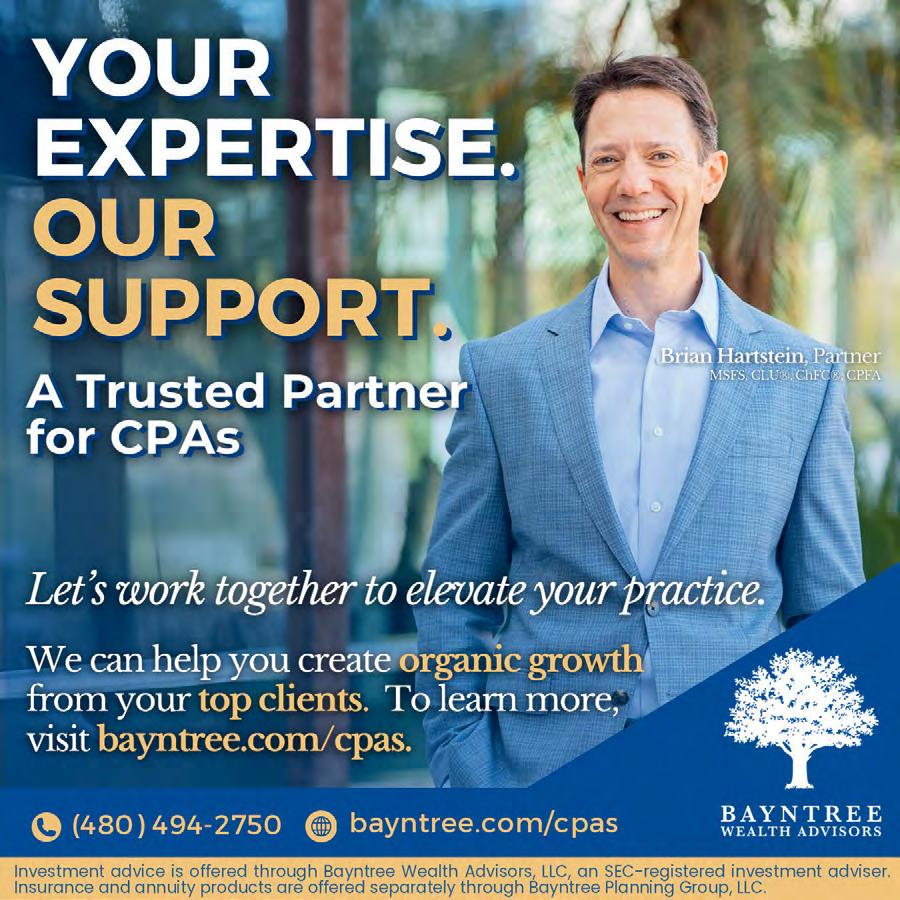

By Emily Webb
Becoming a Certified Public Accountant (CPA) in Arizona requires meeting specific educational, exam, experience and ethics requirements established by the Arizona State Board of Accountancy. As of 2025, these requirements follow a well-defined pathway, but proposed changes are reshaping how aspiring CPAs can obtain licensure. This shift aims to modernize the process and make it more flexible, addressing issues such as the rising cost of education, changing workforce expectations and the need for greater talent in the accounting profession.
The first step toward becoming a CPA in Arizona is meeting the educational requirements through the completion of 150 semester hours from an accredited institution. While a bachelor’s degree is required, candidates have two options to fulfill the remaining credit hour requirement. One way is to obtain a master’s degree and another is to take 30 additional credit hours without obtaining the master’s degree. However, 36 of the semester hours must be in advanced accounting courses to ensure candidates acquire the necessary expertise in the field. The education requirement is designed to provide a broad base of knowledge in accounting, business and other related fields.
Once the educational requirements are met, candidates must pass the Uniform CPA Exam, a comprehensive test covering four sections. You must pass the three required core sections:
• Audit (AUD)
• Financial Accounting and Reporting (FAR)
• Regulations (REG)
You must also pass one discipline section of your choice:
• Business Analysis and Reporting (BAR)
• Tax Compliance and Planning (TCP)
• Information Systems and Controls (ISC)
A passing score of 75 in each section is required.
Along with passing the exam, candidates must also accumulate 2,000 hours of relevant accounting work experience under the supervision of a licensed CPA. This practical experience ensures that candidates can apply their academic knowledge in real-world scenarios.
Additionally, Arizona requires candidates to pass the American Institute of Certified Public Accountants (AICPA) Professional Ethics for CPAs Exam. Candidates must score a minimum of 90%. This final step ensures that prospective CPAs understand the ethical responsibilities associated with their role, which is crucial for maintaining public trust in the profession.
The AICPA and the National Association of State Boards of Accountancy (NASBA) have proposed significant changes to the Uniform Accountancy Act (UAA), which guides the CPA licensure process.
The new pathway does not replace the existing two options but instead complements them. It would allow candidates to become CPAs with a bachelor’s degree in accounting, two years of professional experience and a passing score on the CPA exam. By focusing on work experience rather than additional coursework, the proposal seeks to make the licensure process more accessible and better aligned with the practical needs of the profession.
In addition to the new licensure pathway, the proposal includes a shift to an “individual-based” mobility model. Under this model, CPAs would be able to practice in other states with just one license, making it easier for professionals to work across state lines without the need to obtain multiple licenses. Furthermore, the proposal introduces “safe-harbor” language to protect the practice privileges of current CPAs who meet existing licensure requirements, ensuring that their ability to practice is not compromised by these changes.
The proposed changes are driven by several key factors, including the evolving landscape of education, shifting workforce expectations and the ongoing talent shortage in the accounting profession.
The rising costs of higher education have made the traditional 150-credithour requirement a financial burden for many students. With tuition costs increasing, many prospective candidates find it difficult to justify the time and expense involved in meeting this requirement. The new pathway is intended to reduce this barrier, making it more feasible for individuals to enter the profession without additional financial strain.
Moreover, younger generations of professionals increasingly value flexibility, work-life balance and practical experience over traditional academic credentials. Many of these candidates are attracted to careers that allow them to gain real-world experience while maintaining a better work-life balance. The new licensure pathway reflects this shift by focusing more on practical skills gained in the workplace rather than classroom time.
This change is also a response to the evolving nature of accounting work, which increasingly requires proficiency in areas such as data analytics, IT and advisory services. The modern CPA must be adaptable, and the new pathway aims to ensure that future CPAs are equipped with the relevant skills needed for today’s accounting challenges.
The accounting profession also faces significant challenges related to talent shortages. With many graduates choosing careers in other fields such as finance, consulting or technology, accounting firms are struggling to attract and retain qualified professionals. These proposed changes are a proactive effort to address the challenges faced by aspiring CPAs and the accounting profession at large.

Coulson Painter
ASCPA Director 2025-2027
Company Controller The Shield Companies and EcoShield Pest Solutions
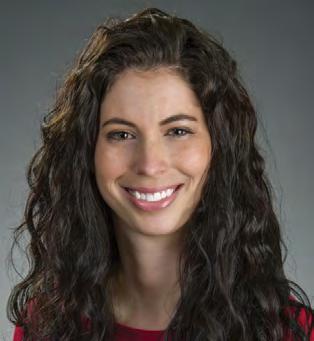
Marissa Graves
ASCPA Director 2023-2026
Financial Controller Best Self Aesthetics

Oliver Yandle President & CEO
Arizona Society of CPAs

Anne Rogers
ASCPA Director 2025-2027 Manager Deloitte

Kelly Damron
AICPA Council Member 2024-2027
Accounting Chair Grand Canyon University

Helen Stewart
ASCPA Director 2025-2027 Director of SEC Reporting Insight Enterprises, Inc.
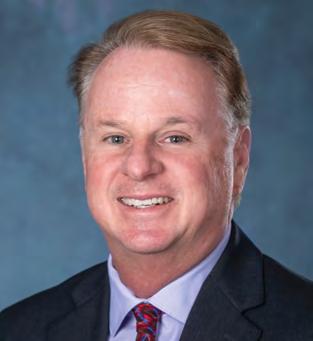
Tom Duensing
AICPA Council Member 2024-2027
Retired Chief Deputy City Manager City of Tempe
“Since 1933, the Arizona Society of CPAs has been an integral part of a CPA’s journey in Arizona. We have flourished because of the willingness of our members to engage and share their expertise with one another and our community. On behalf of the ASCPA and our members, I extend my sincere gratitude to our incoming and continuing board members. Their commitment to help shape not only our organization, but the entire CPA profession in our state is inspiring.”


THURSDAY, JUNE 26,


By Sarah C. Zelhart, CPA
As giving grows more digital and donor-driven, nonprofit ratings play a bigger role in shaping trust and attracting support. Understanding how these ratings work – and how to improve them, is now essential for every nonprofit.
The Arizona Society of CPAs is committed to enhancing your membership experience and providing opportunities to discover increased value in ways that resonate with you. Here are some opportunities to experience greater value in your membership:
Making connections and building relationships can be challenging. Step out of your comfort zone and discover how your community can be your resource and support.
May 8
ASCPA Annual Meeting & Award Luncheon
www.ascpa.com/annual
May 14
Spring Finance Mixer CPAs & Bankers www.ascpa.com/mixer
June 26
Not-for-Profit Conference www.ascpa.com/npc
October 20 & 21
Converge25 www.ascpa.com/converge
Nov. 19
ABC (Attorneys, Bankers, CPAs) Networking Event www.ascpa.com/abc
To register or learn more about these events, visit www.ascpa.com/ specialevents
You have access to the combined knowledge of your peers with the Connect online community, www.ascpa.com/connect
• Volunteer for exciting student initiatives that support future CPAs.
• Speak at conferences to share your expertise and enhance your professional brand. Contribute articles to the AZ CPA magazine and website to share your knowledge with fellow CPAs.
• Get involved: www.ascpa.com/volunteer
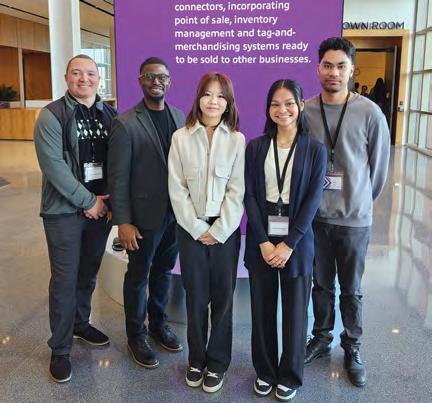
Your ASCPA membership helps you save money and provides exciting learning opportunities tailored to your needs.
• MEMBER APPRECIATION FREE CPE DAYS:
In addition to our year-round, one-hour webinars, we have an exciting two-day event on November 12-13 – giving you the chance to earn up to 12 CPE credits! Don’t miss out on this incredible learning opportunity. Mark your calendar – registration opens in August.
• EXPANDING SELF-STUDY OFFERINGS: Learning doesn’t always occur during “normal” business hours. So, we expanded our self-study catalog, adding 300+ Surgent offerings and will continue to add more throughout the year. Stay tuned.
• ETHICS IS COMING TO YOUR TOWN: Professional Issues Updates and Professional Ethics Updates will be live and in person in Prescott, Flagstaff, Tucson and Yuma. Join for the free one-hour update or stay half the day and earn your ethics CPE.
• INTRODUCING THE ARIZONA TAX WORKSHOP: Previously known as the Phoenix Tax Workshop, this cost-effective tax program series meets online on Friday mornings eight times per year. Earn up to 24 CPE credits from the comfort of your home or office.
Learn more and register for these offers at www.ascpa.com/cpe
1,802 pieces of legislation reviewed for impact to the profession
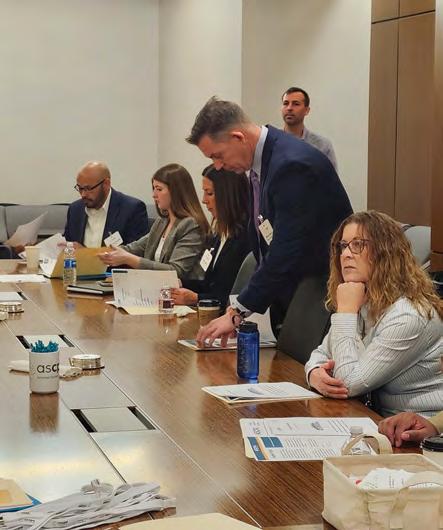
Gov. Hobbs signs income tax conformity HB 2688 (second fastest in the last 20+ years)


in the CPA profession. We are proud to celebrate your 50 years of membership!
Tony Astorga
Bruce Beach
Linda Becker
R. Gregory Blake
Patrick Callan
Mark Eberle
Michael Ginsburg
Loren Greenberg
Charles Hummel
Michael Katz
Craig Koopman
David Manderfeld
Robert Martin
Martin O’Shea
David Peachin
Carlos Torrella John Tull
View a full list of members commemorating their ASCPA anniversaries at www.ascpa.com/anniversary
The ASCPA is the voice of the CPA profession at the Arizona Legislature and provides nonpartisan technical expertise on accounting, finance, business and tax policy. As an ASCPA member, your support strengthens our role in the legislative process. The ASCPA continues to:
Work with the Arizona Department of Revenue to address concerns brought forth by members and legislators.
• Successfully host events like CPA Day at the Capitol and Tax Conformity Debrief to affirm relationships with legislators and inform them of top issues impacting the profession.
• Advocate for the successful passage of legislation to conform to the federal internal revenue code and protection of the gold standard of licensure set by the CPA profession.
• Partner with the Arizona State Board of Accountancy to protect the CPA credential and the public.




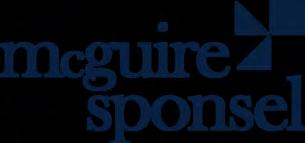




This past quarter, the ASCPA engaged with accounting students across Arizona through multiple events.
At Grand Canyon University, we collaborated with the GCU Accounting Society for the Road to the CPA event, where ASCPA members Erin Taylor, Jessica Iennarella and Lori Pittman provided career insights and answered student questions.
We also partnered with Northern Arizona University to host a virtual Road to the CPA event, featuring CPA panelists Erin Taylor, Daniel Hurtado, Michelle Howell and Madeline Moran, who shared career advice with students.
We also participated in GCU’s and the University of Arizona’s Meet the Firms events, where students explored scholarship opportunities and signed up for free ASCPA student memberships.
Our outreach continued at Arizona State University’s W.P. Carey Annual Scholarship Luncheon, where immediate past chair Andrea Levy and Student & Member Engagement Manager Jamar Jones connected with scholarship recipients.
To further support aspiring CPAs, we encourage donations to the Arizona CPA Foundation for Education & Innovation, www.ascpa.com/donate and organizations can support student programming and membership through our student program sponsorships, www.ascpa.com/sponsorstudents.

In February, the ASCPA co-hosted a successful and exciting Behind the Scenes event at Insight. Rachel Crump, ASCPA past chair and chief accounting officer at Insight, and Jack DeBruyn, vice president of finance systems at Amkor Technology presented on “Exploring Generative AI (GenAI) in the Finance Sector.” This was followed by a tour of the cutting-edge Insight headquarters. The event connected experienced CPAs with enthusiastic accounting students, creating a dynamic atmosphere for networking and learning.
A big thank you to Insight for their ongoing support and sponsorship of the ASCPA’s student programming. Learn more at www.ascpa.com/ insight.

By Claire Burke, CPA (licensed in MD)
New technology solutions are opening the door for accounting and finance professionals to become the analytical thinkers and problem-solvers of the future. Don’t get left behind.
In the accounting and finance world, the adoption of new technology is gaining speed, providing both opportunities and challenges for organizations. As we corporate finance professionals strive to drive greater efficiencies and value by implementing the tools available today, I wonder just how far we’ll be able to go with the technologies of tomorrow. Let’s first imagine a world where certain finance functions are performed automatically, like accounts payable and receivable processing, journal entry preparation, account reconciliations, daily system balancing and compiling spreadsheets to create financial reports. Next, imagine us accounting and finance professionals being able to focus more exclusively on value-added work, like analyzing data outputs, reviewing trends and flux analyses, and spending more time understanding the drivers impacting financial results
to provide meaningful insights to business leaders. Fortunately, this is becoming less of a “what-if scenario” thanks to artificial intelligence (AI), machine learning (ML) and robotic process automation (RPA). As a reminder:
• AI is essentially a collection of technologies that use ML and other techniques to help a business perform tasks that typically require human intelligence. It’s a computer’s ability to learn and mimic human thinking, like judgement-based decisions, reasoning, and cognition.
• ML is the use of algorithms and data to enable a computer to learn from data and make decisions or predictions without being explicitly programmed to do so.
• RPA uses software to automate repetitive production tasks to streamline business processes. It also mimics human behavior to automate consistent, routine workflows in an effort to boost productivity (think bots). It’s a great tool for processes that involve a high-transaction rate of repetitive tasks. Notably, the use of bots in the business world has become so pervasive that they’re now more frequently referred to as “digital workers.”
When you put all three of these together, you get intelligent automation, which is a scalable, cognitive automation technology that can automate processes and increase efficiency and accuracy.
While we’re not yet at a point where we can automate all accounting and finance functions, there are several workflows that are good candidates for what can be automated now. For example, accounts payable can use RPA to streamline the workflow of approving invoices, matching invoices to purchase orders and issuing payments. Another use case is financial reporting, where RPA can automate the process of data collection, analysis and report generation. Many of us are still using spreadsheets for more customized financial reporting and analysis, which entails compiling data from multiple files, editing links to these files, or worse, inputting data directly in the spreadsheet from other sources. By teaching software that uses RPA to do this work, the process can be automated and completed with a few mouse clicks, cutting the time needed to perform a task from hours to minutes. It also improves the quality of the financial reports by enhancing accuracy and reducing human error. AI can also assist with account reconciliations, turning a time-consuming, rote task into a more streamlined, real-time process.